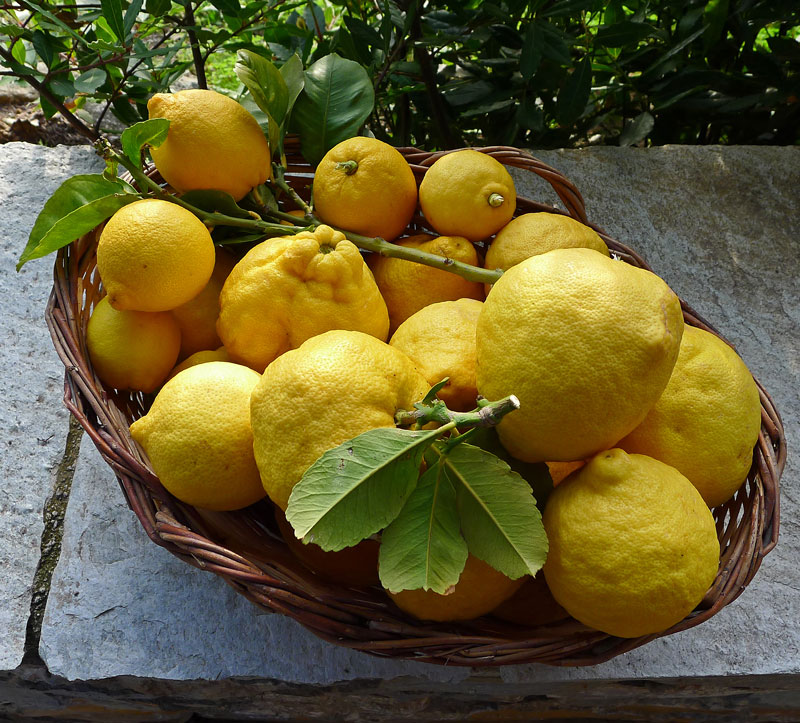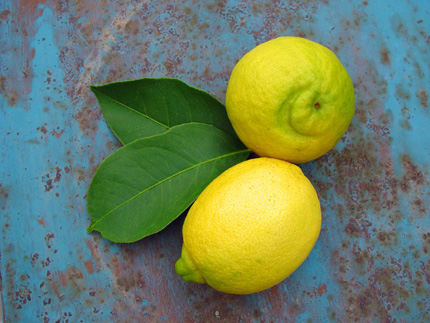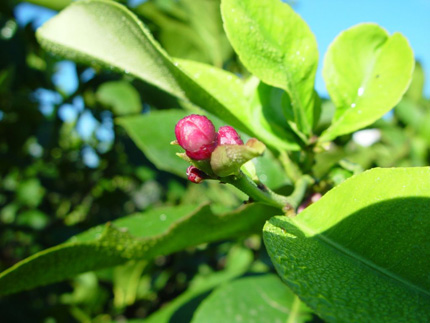Our lemon harvest is so plentiful this year that I cannot stop making several batches of marmalade, lemon curd, cakes, liqueurs, lemonade, preserved lemons etc. and still I have plenty of wonderful large and fragrant fruits to offer to friends. 

My mother used to keep a couple of juiced lemon halves by the sink, and she would rub her hands often with the lemons, to keep her hands soft and white. Even at the age of ninety-three, after a lifetime of cooking and cleaning, her hands were still silky and beautiful.
We take lemons for granted in Greece; every Greek pantry has a steady supply of lemons which, along with salt, pepper, and olive oil, is considered an essential and basic ingredient. I didn’t give lemons much thought, until some years ago.
I was sitting with my friend, food and music writer Fred Plotkin, at a trattoria in Otranto, a pretty little town in Puglia, on the heel of the Italian boot, the edge of Magna Graeca. It was a blazing hot summer afternoon, and I was very excited because I was finally going to taste fava e cicorie (mashed fava beans and steamed greens), a traditional country dish of the area.
While we waited for our meals, Fred and I discussed the similarities between Greek and southern Italian peasant cuisine. As we talked, I became more and more eager to taste the Italian version of what to me sounded a lot like the traditional Greek fava (mashed fava beans or yellow split peas) with horta (steamed greens). The fava e cicorie arrived warm, drizzled with fragrant green olive oil and sprinkled with coarsely ground black pepper.
“Go on, taste it,” said Fred.
“I’m waiting for the lemon,” I replied, expecting the waiter to return with a plate of halved or quartered lemons.
“Fava e cicorie has no lemon,” Fred said. “Lemon is a Greek perversion!”

Lemons play an important role in keeping the artichokes white, while we peel and prepare them.

He was right, of course, and only then did I become conscious of the true obsession Greeks have with lemons. I couldn’t help thinking that the sweet and earthy mashed fava beans, the slightly bitter greens and the fruity olive oil, would be so much better drizzled with freshly squeezed lemon.
Lemon’s Origins
Though the origin of the lemon is unknown (some think it came from Southeast Asia, others believe it originated in northern India) it is thought that lemons were introduced to the Mediterranean by the Arabs, who brought them from Persia around the 11th century. They were immediately adopted into the culinary arts, as their fragrant sour juice perfectly complemented the rich-flavored Greek olive oil. Lemons soon replaced vinegar and the juices of unripe grapes, pomegranates, and all kinds of tart fruits that had been used to provide acidity to both sweet and savory dishes ever since antiquity.

Anybody who has had even a single meal at a humble taverna or a formal restaurant on the mainland or the islands realizes how passionate Greeks are about the special acidic taste lemon adds to foods. Halved lemons are omnipresent, served alongside fried, broiled, or poached fish, calamari, mussels, and grilled octopus; charcoal-grilled lamb, chicken, pork chops, souvlaki (kebabs), and fried meatballs; with bean soups, cabbage, lettuce, cauliflower, broccoli, and all kinds of green salads, including boiled beets, and horta (blanched greens). Many meat and vegetable dishes, like arni (lamb) or moskari (veal) lemonato, a much-loved Sunday family dish, are cooked in a lemony sauce with olive oil, onions, and fennel or dill.
I have two old lemon trees in my garden. They were in a sorry state when we came, but with organic fertilizer and steady irrigation, they produce fruit almost all year-round and provide me with lemons with thick and wonderfully aromatic peels. It is not uncommon to find ripe yellow lemons, tiny green fruits. and heavily perfumed flowers on the same tree, at different stages in maturation. I treasure each lemon that I harvest, and have come up with uses for each part of the fragrant peel and, of course, the flesh. I am constantly making lemon liqueur, rolled lemon peel preserves or marmalade, and always have plenty of fresh or frozen lemon juice on hand to use in cooking and baking
Avgolemono sauce
The most elegant of all Greek sauces, avgolemono (a sauce of eggs and lemon juice) seems to have its roots in the Sephardic agristada. It probably came with immigrants of Jewish decent who settled in Greece after fleeing from Spain in the 16th century. 
Agristada and avgolemono both cleverly use eggs beaten with lemon juice to create an emulsion which thickens cooking juices, much in the way the French use tangy crème fraîche. Avgolemono is used to flavor meat, fish and vegetables. Fish soup avgolemono, usually made during the cold winter months, and magiritsa, a traditional Easter soup prepared with lamb innards, and scented with scallions and dill, are popular all over Greece. Here in Kea, I have learned to complement green beans and artichokes stewed together with fresh favas in their pods with avgolemono, prepared with the wonderful, deep-yellow yolks of my neighbour’s fresh eggs.
Lemon vinaigrette
My dressing of choice for potato salad, grilled fish, and green salads is a lemon vinaigrette, jazzed-up with fragrant lemon zest.
Combine 1/4 cup extra virgin olive oil, 2 to 3 tablespoons lemon juice, a pinch of salt, and 1 to 2 teaspoons of the lemon zest. Add a generous quantity of chopped scallions and dill, and the vinaigrette becomes an ideal dressing for smoked fish like trout, salmon, and kippers.
 FOR BAKING, I like to use a light, aromatic, lemon-scented oil. I learned from my mother to warm olive oil to just below boiling with a four-inch piece of lemon rind. I use the lemon-infused oil to brush phyllo dough for butter-free baklava, and also use it in recipes for cakes and biscuits.
FOR BAKING, I like to use a light, aromatic, lemon-scented oil. I learned from my mother to warm olive oil to just below boiling with a four-inch piece of lemon rind. I use the lemon-infused oil to brush phyllo dough for butter-free baklava, and also use it in recipes for cakes and biscuits.
FOR DRIZZLING OVER SAVORY FOODS, I make an aromatic and slightly tart oil. Combine one cup of olive oil with a sliced medium sized lemon (peel and flesh) and heat it to a strong simmer. Take it off the heat and let it cool; add one more cup of olive oil. Let the infusion steep overnight. Strain it through a cheesecloth-lined fine-mesh sieve and taste it —if it’s too lemony, add more olive oil. This lemony oil is excellent served with crusty bread; I also love to drizzle it over grilled chicken, lamb, bean and chickpea soup, and tomato salad.
Lemon Blossoms and Leaves
On th e island of Chios, in the eastern part of the Aegean, the aromatic flowers of the lemon tree are cooked in heavy syrup and made into an unusual sweet that is traditionally served at weddings and engagement parties. The glossy, dark-green, aromatic leaves of the lemon tree are often used in place of tiny doilies, to serve almond biscuits or the traditional diamond-shaped pieces of pasteli (sesame seed and honey candy).
e island of Chios, in the eastern part of the Aegean, the aromatic flowers of the lemon tree are cooked in heavy syrup and made into an unusual sweet that is traditionally served at weddings and engagement parties. The glossy, dark-green, aromatic leaves of the lemon tree are often used in place of tiny doilies, to serve almond biscuits or the traditional diamond-shaped pieces of pasteli (sesame seed and honey candy).
RECIPES:
Braised Meat with Artichokes in Egg and Lemon Sauce
Olive Oil, Lemon and Yogurt Cake
Lemon Liqueur, and Thyme and Lemon Liqueur
Barbara’s Lemon Syrup (Lemonade)
Lemon Curd with Lemon Marmalade
Lemon or Seville Orange Marmalade
I just love everything you said about lemons. I am going to check out your books!
Thanks for all the interesting recipes. I live in Florida and have lime trees.
I will try them too. Lemons are still number one for me.
Aglaia,
This is a wonderful column. I treasure the lemon tree in our yard too. You shared some delicious ideas. I’m going to start leaving a. cut lemon half at the kitchen sink. I hope my hands become soft like your mother’s.
Thank you so much for this post!!! I’m sending it to everyone who’s ever been to a restaurant with me, and watched with amusement as I begged the waitstaff to bring me sliced lemons